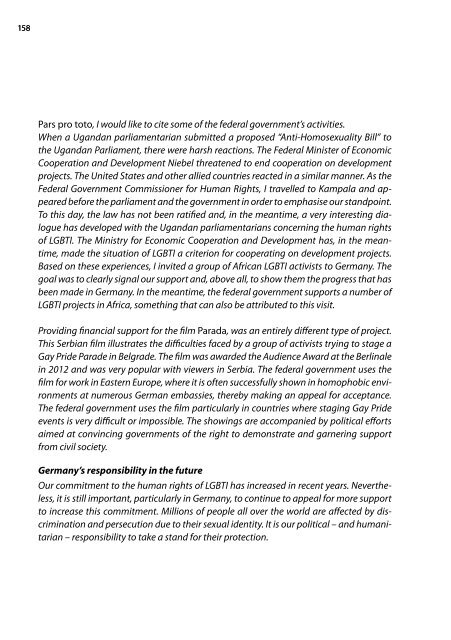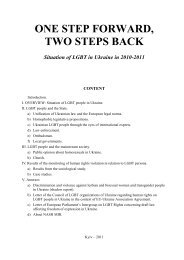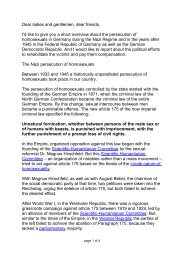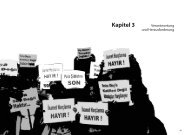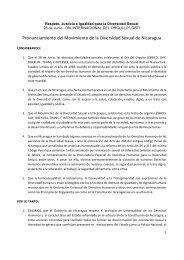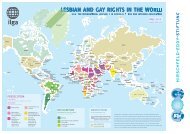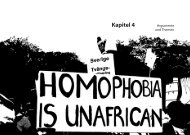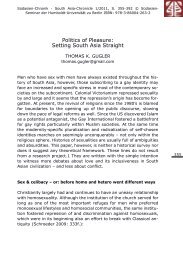Vom Verbot zur Gleichberechtigung - Hirschfeld-Eddy-Stiftung
Vom Verbot zur Gleichberechtigung - Hirschfeld-Eddy-Stiftung
Vom Verbot zur Gleichberechtigung - Hirschfeld-Eddy-Stiftung
Erfolgreiche ePaper selbst erstellen
Machen Sie aus Ihren PDF Publikationen ein blätterbares Flipbook mit unserer einzigartigen Google optimierten e-Paper Software.
158<br />
Pars pro toto, I would like to cite some of the federal government’s activities.<br />
When a Ugandan parliamentarian submitted a proposed “Anti-Homosexuality Bill” to<br />
the Ugandan Parliament, there were harsh reactions. The Federal Minister of Economic<br />
Cooperation and Development Niebel threatened to end cooperation on development<br />
projects. The United States and other allied countries reacted in a similar manner. As the<br />
Federal Government Commissioner for Human Rights, I travelled to Kampala and appeared<br />
before the parliament and the government in order to emphasise our standpoint.<br />
To this day, the law has not been ratified and, in the meantime, a very interesting dialogue<br />
has developed with the Ugandan parliamentarians concerning the human rights<br />
of LGBTI. The Ministry for Economic Cooperation and Development has, in the meantime,<br />
made the situation of LGBTI a criterion for cooperating on development projects.<br />
Based on these experiences, I invited a group of African LGBTI activists to Germany. The<br />
goal was to clearly signal our support and, above all, to show them the progress that has<br />
been made in Germany. In the meantime, the federal government supports a number of<br />
LGBTI projects in Africa, something that can also be attributed to this visit.<br />
Providing financial support for the film Parada, was an entirely different type of project.<br />
This Serbian film illustrates the difficulties faced by a group of activists trying to stage a<br />
Gay Pride Parade in Belgrade. The film was awarded the Audience Award at the Berlinale<br />
in 2012 and was very popular with viewers in Serbia. The federal government uses the<br />
film for work in Eastern Europe, where it is often successfully shown in homophobic environments<br />
at numerous German embassies, thereby making an appeal for acceptance.<br />
The federal government uses the film particularly in countries where staging Gay Pride<br />
events is very difficult or impossible. The showings are accompanied by political efforts<br />
aimed at convincing governments of the right to demonstrate and garnering support<br />
from civil society.<br />
Germany’s responsibility in the future<br />
Our commitment to the human rights of LGBTI has increased in recent years. Nevertheless,<br />
it is still important, particularly in Germany, to continue to appeal for more support<br />
to increase this commitment. Millions of people all over the world are affected by discrimination<br />
and persecution due to their sexual identity. It is our political – and humanitarian<br />
– responsibility to take a stand for their protection.


